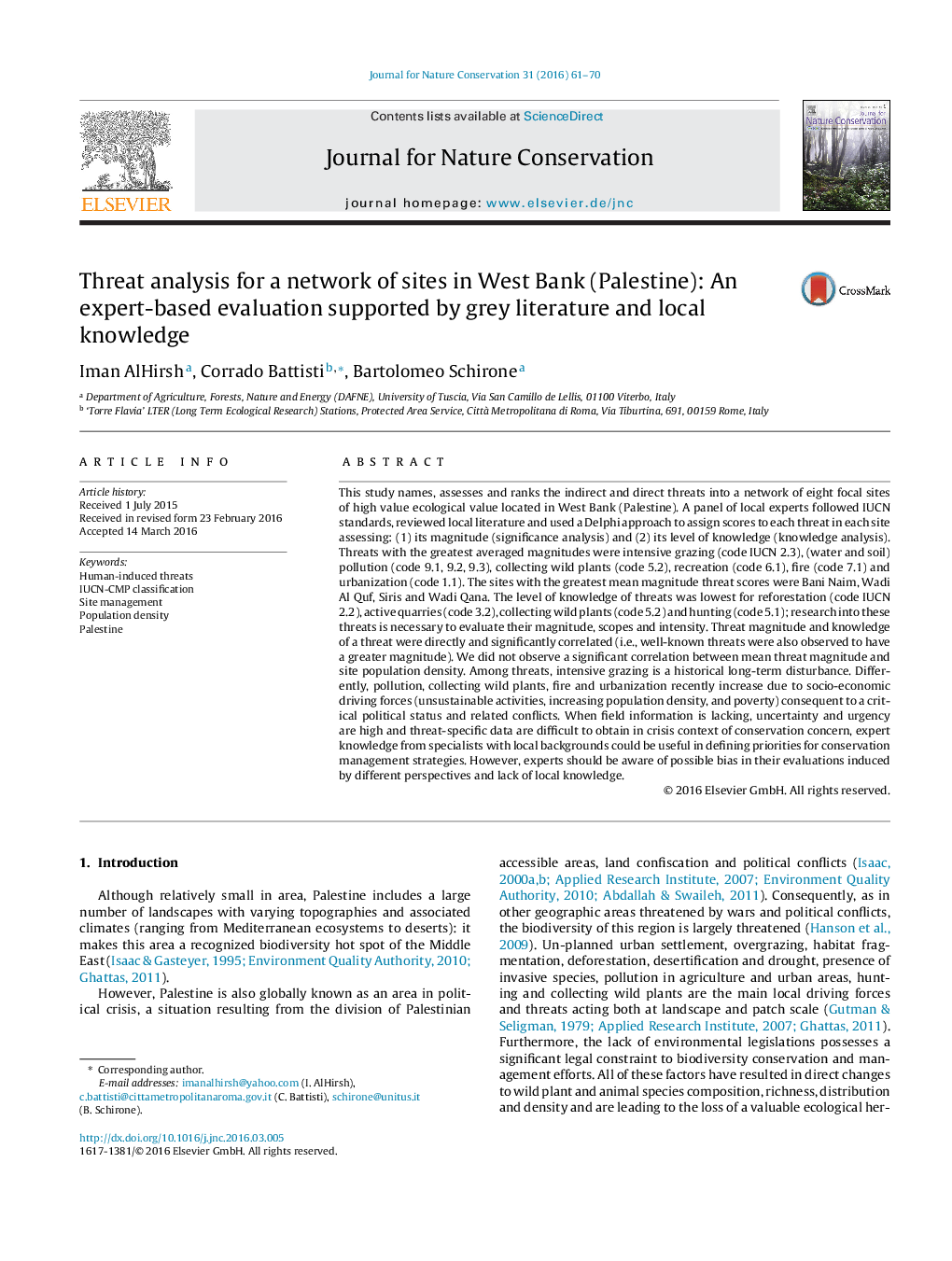| کد مقاله | کد نشریه | سال انتشار | مقاله انگلیسی | نسخه تمام متن |
|---|---|---|---|---|
| 6305413 | 1618537 | 2016 | 10 صفحه PDF | دانلود رایگان |
عنوان انگلیسی مقاله ISI
Threat analysis for a network of sites in West Bank (Palestine): An expert-based evaluation supported by grey literature and local knowledge
ترجمه فارسی عنوان
تجزیه و تحلیل تهدید برای شبکه ای از سایت ها در کرانه باختری (فلسطین): ارزیابی مبتنی بر متخصص با حمایت ادبی خاکستری و دانش محلی
دانلود مقاله + سفارش ترجمه
دانلود مقاله ISI انگلیسی
رایگان برای ایرانیان
موضوعات مرتبط
مهندسی و علوم پایه
علوم زمین و سیارات
علوم زمین و سیاره ای (عمومی)
چکیده انگلیسی
This study names, assesses and ranks the indirect and direct threats into a network of eight focal sites of high value ecological value located in West Bank (Palestine). A panel of local experts followed IUCN standards, reviewed local literature and used a Delphi approach to assign scores to each threat in each site assessing: (1) its magnitude (significance analysis) and (2) its level of knowledge (knowledge analysis). Threats with the greatest averaged magnitudes were intensive grazing (code IUCN 2.3), (water and soil) pollution (code 9.1, 9.2, 9.3), collecting wild plants (code 5.2), recreation (code 6.1), fire (code 7.1) and urbanization (code 1.1). The sites with the greatest mean magnitude threat scores were Bani Naim, Wadi Al Quf, Siris and Wadi Qana. The level of knowledge of threats was lowest for reforestation (code IUCN 2.2), active quarries (code 3.2), collecting wild plants (code 5.2) and hunting (code 5.1); research into these threats is necessary to evaluate their magnitude, scopes and intensity. Threat magnitude and knowledge of a threat were directly and significantly correlated (i.e., well-known threats were also observed to have a greater magnitude). We did not observe a significant correlation between mean threat magnitude and site population density. Among threats, intensive grazing is a historical long-term disturbance. Differently, pollution, collecting wild plants, fire and urbanization recently increase due to socio-economic driving forces (unsustainable activities, increasing population density, and poverty) consequent to a critical political status and related conflicts. When field information is lacking, uncertainty and urgency are high and threat-specific data are difficult to obtain in crisis context of conservation concern, expert knowledge from specialists with local backgrounds could be useful in defining priorities for conservation management strategies. However, experts should be aware of possible bias in their evaluations induced by different perspectives and lack of local knowledge.
ناشر
Database: Elsevier - ScienceDirect (ساینس دایرکت)
Journal: Journal for Nature Conservation - Volume 31, June 2016, Pages 61-70
Journal: Journal for Nature Conservation - Volume 31, June 2016, Pages 61-70
نویسندگان
Iman AlHirsh, Corrado Battisti, Bartolomeo Schirone,
